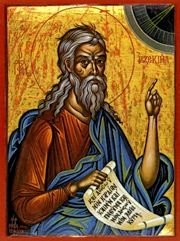St. Augustine on the House Built on Rock

Commentary on this week's Gospel: 9th Sunday in Ordinary Time
Matthew 7:21-27
The House Built on Rock, The House Built on Sand
Taken from Biblia Clerus http://www.clerus.org/bibliaclerus/index_eng.html
From St. Augustine's exposition of the Sermon on the Mount:
87. Hence we must take special notice how terribly the conclusion of the whole sermon is introduced: “Therefore, whosoever heareth these sayings of Mine, and doeth them, is like 242 unto a wise man, which built his house upon the rock.” For no one confirms what he hears or understands, unless by doing. And if Christ is the rock, as many Scripture testimonies proclaim 243 that man builds in Christ who does what he hears from Him. “The rain descended, and the floods came, and the winds blew, and beat 244 upon that house; and it fell not: for it was founded upon a rock.” Such an one, therefore, is not afraid of any gloomy superstitions (for what else is understood by rain, when it is put in the sense of anything bad?), or of turnouts of men, which I think are compared to winds; or of the river of this life, as it were flowing over the earth in carnal lusts. For it is the man who is seduced by the prosperity that is broken down by the adversities arising from these three things; none of which is feared by him who has his house founder upon a rock, i.e. who not only hears, but also does, the Lord’s commands. And the man who hears and does them not is in dangerous proximity to all these, for he has no stable foundation; but by hearing and not doing, he builds a ruin. For He goes on to say: “And every one that heareth these sayings of Mine, and doeth them not, shall be like unto a foolish man, which built his house upon the sand: 245 and the rain descended, and the floods came, and the winds blew, and beat 246 upon that house; and it fell: and great was 247 the fall of it. And it came to pass, when Jesus hid ended these sayings, the people were astonished at His doctrine: for He taught them as one having authority, and not as their scribes.”248 This is what I said before was meant by the prophet in the Psalms, when he says: “I will act confidently in regard of him. The words of the Lord are pure words: as silver tried and proved in a furnace of earth, purified seven times.” 249 And from this number, I am admonished to trace back those precepts also to the seven sentences which He has placed in the beginning of this sermon, when He was speaking of those who are blessed; and to those seven operations of the Holy Spirit, which the prophet Isaiah mentions; 250 but whether the order before us, or some other, is to be considered in these, the things we have heard from the Lord are to be done, if we wish to build upon a rock.
242 Similis est… Vulgate, assimilabitur. Meyer, Tholuck, etc, refer this to the future judgment, “I will make him like,” etc., when Christ will establish those who keep His sayings for ever (opposed by Alford etc)..
244 Offenderunt; Vulgate, irruerunt.
245 The transitory teachings and institutions of men as opposed to Christ’s own word.
246 Offenderunt; Vulgate, irruerunt.
247 Facta est; Vulgate, fuit.
248 Vulgate adds et Pharisaei. The people were astonished, not merely at His teachings, but the dignity and self-consciousness with which Christ uttered them, quod nova quaedam majestas et insueta hominum mentes ad se raperet (Calvin). The Scribes spoke as expounders of the law, and referred back to Moses for their authority; Christ spoke in His own name, and as an independent legislator, vested with greater authority than Moses and a higher dignity. The Scribes by elaborate sophistry often drew many meanings from a single precept, and burdened the people with an intricate and endless variety of precepts for the details of conduct, laying painful stress upon their observance; Christ directed attention from outward acts to the motive and intent of the heart. “He opposed a genuine righteousness to the mock righteousness of the Scribes and Pharisees.”
Labels: Church Fathers, Sacred Scripture, saints

